Back to The Riders of the Plains.
The following is an excerpt from The Riders of the Plains: A Reminiscence of the Early and Exciting Days in the North West(1905), by Cecil Edward Denny. This work is in the public domain.
Continued from Chapter V: Off for the West.
Chapter VI
On the March
JULY 9 WE resumed our march, but did not start until well into the afternoon. During the night, in a heavy storm, about 50 head of cattle strayed off and 20 head of horses stampeded. These were, however, recovered the next morning, and it was not until late at night that the carts all got in, the half breeds being in the sulks. We had to send three wagons back to Dufferin, as we had not horses enough to draw them. They contained luxuries which the commissioner thought could be spared. One of our officers let us here and returned east and did not rejoin the force. We travelled for some distance along the Pembina river, and were all sorry to leave. We did not expect too much water on the plains, and the weather being hot, a bath now and then after a hard day’s march was delightful. We were kept on the lookout for several days by reports coming in of depredations committed by Sioux Indians across the line, not far from us. Mounted sentries were placed at night over the horses. Good water was scarce after the first few days, and both men and horses suffered considerably for want of it. Our rations also, without tea, were not of the most dainty kind. Hardly a night passed without a heavy thunder storm. This country seemed to be the home of those kinds of storms, which we experienced almost every day.
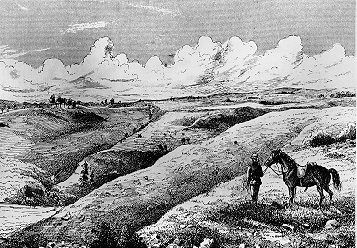
We travelled for a considerable distance along the boundary survey road, which made the marching comparatively easy. At Pembina mountain, which is a beautiful spot, we remained a short time. Here we met with the first locusts, the air being literally alive with them. A tremendous hail storm struck us here, with hail stones as large as pigeon eggs, causing another stampede of the horses. They were all recovered.
On July 13 we camped at Calf mountain. Here hay was cut for the horses with the mowing machine we had with us, it not being deemed safe to turn the horses out to herd. Pembina mountain was a hard pull to cross, pretty well tiring out the horses. What made matters worse, we had to camp that night without water. The locusts were as thick as ever, and the mosquitoes nearly ate us up. Our travelling had been so far at the rate of about 20 miles a day, which was quite enough, as the horses suffered considerably.

The only game seen had been a few antelope, none of which we could get near. We saw the first buffalo skulls west of Pembina mountain, but many hundred miles would have to be travelled before we came across the living animals. At Pembina mountain a party of halfbreeds selected by the governor of Manitoba joined us. They brought presents for Indian chiefs and were supposed to assist the force as interpreters and guides, but they knew little or nothing of the country after getting beyond the Cypress hills. The only Indian language they could speak was Cree, which was of no use to us. We did not go near the Cree country, which lies along the North Saskatchewan river, several hundred miles to the north. We met a party of the boundary survey going east for supplies. They reported having fired at some Indians who were trying to run off with their horses. From this point our rations were cut down. It was seen by our slow progress that the journey would be longer than anticipated, and unless we were very careful our supplies would give out before we got through. July 17 the horses began to give out and the wagons were strewn all along the road. They did not all arrive in camp until ten o’clock at night. We had no water frequently for man or beast, making it much harder on all of us. No doubt so many dry camps were due to the ignorance of the guides, on whom we had to place all dependence, knowing nothing about the geography of the country ourselves. July 18 I was on rear guard, and a day I had of it! Some 20 sick horses, and 15 or 20 horse and ox teams had to be gotten along. I had to camp out that night without shelter or food, being unable to bring them into camp, and in a pouring rain, which came pretty hard on all of us.
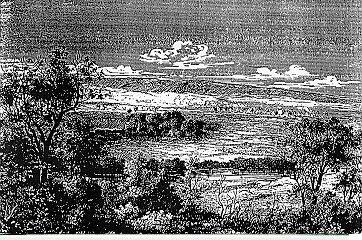
I caught up with the main body the next day, when we made the Souris river, at which place we had a welcome rest of several days. This made us forget the last few days of wet and hunger which we had experienced in making the 200 miles from Dufferin to that point. The two days we remained at this point did us all much good. We had a good rest and clean up, and overhauled the baggage, which had been well soaked. It is a beautiful spot and we should have liked to have remained much longer. At that time there were no settlements on the Souris river, but it is today thickly populated with thriving towns and farms. It is splendid wheat growing country. We had to leave some sick horses behind at that point, they being unable to keep up.
At the second crossing of the Souris we met some more of the boundary survey party returning, having completed their work. The feed here was scant. Our horses suffered considerably, and we had to abandon some more of them. We passed the hill of the murdered scout on July 23. The story goes that an Indian scout had been murdered by one of his tribe. The stone with which it was done is said to be still on the top of the hill. We reached Roche Percee July 24. The horses being nearly played out from fatigue and want of food and water, many of them laying down by the roadside, and the rest were hardly able to drag along. This looked ominous for our success, as our journey had only begun. Many hundred miles had still to be travelled, and the stock was already in bad condition. The eastern horses failed rapidly on prairie grass. Rations had been cut down, being barely sufficient to keep us going with the hard work we had to do. At Roche Percee we made a long halt, and at this point a troop, under command of Lieutenant Colonel Jarvis, left us, going north via Ft. Ellis, Ft. Pitt and Carleton to Edmonton, on the North Saskatchewan river. That was the point at which they were to be stationed. Fifty men went with him and over half of our wagons were sent by him to Ft. Ellis. This troop had a long and hard trip before they reached Ft. Edmonton. They remained that winter in the Hudson’s Bay company’s fort at that place. We did not hear from them again that year, and no communication was had with them until the following spring. They were, however, within easier reach of communication with the east, as there was regular mail communication between Edmonton and Winnipeg, via Ft. Pitt and Carleton, run by the Hudson’s Bay company. They took with them most of our sick horses, thereby relieving us of that encumbrance.
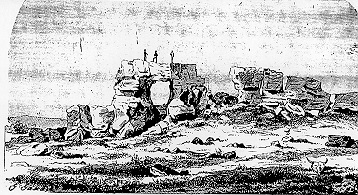
While resting at Roche Percee we had time to get our transport into pretty good shape. We found an abundance of coal, which was used in our portable forges. Roche Percee is a beautiful spot, with plenty of good feed and water. We also laid in a considerable supply of wood, which we did not expect to get for a long time. A week’s rations were cooked in advance, so by July 30 we were ready to start west again, with a diminished force of both men, horses and wagons. We made 26 miles July 31 and still found good feed and water. The weather had turned cold and the horses did fairly well. We were making pretty long day’s journeys, being up at daybreak. The camp was struck and ready to move by five o’clock. The guard duty was heavy. One officer, a picket, and a camp guard of some 15 men were detailed every night, and the officer on duty the whole night generally had to take either the advance or rear guard the next day. We therefore found we had enough to do, especially as when on rear guard we had to bring up the stragglers and teams that were exhausted, often not arriving in camp for many hours after the camp had been pitched and settled down.
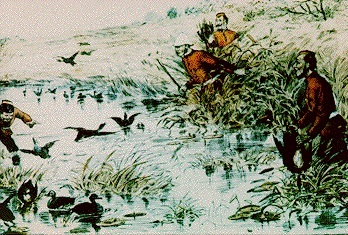
We had so far seen no game except a few antelope, but birds were abundant. We killed large numbers of ducks of all kinds. The country through which we were passing was full of lakes, and this kind of game was very plentiful. Several of the men got lost while duck hunting, and in one instance, although rockets were fired at night to guide them to camp, were not found until the following day. They had quite enough. Aug. 3 we had a bad night, tents being blown down by a tornado. We had to stand by the horses until morning.
We had lived on bacon so far, and on August 4 we went into camp and our assistant commissioner, Lieutenant-Colonel Macleod, with several wagons, left us to go south some 40 miles to a small halfbreed and trading settlement named Wood mountain, to procure pemmican and if possible more forage for the horses. He was to meet us some days’ journey farther west. At this point we left the boundary survey road which we had followed, and struck out across the open prairie, travelling principally by compass. On August 6 we crossed a high wooded country, laying in a stock of wood. Here we saw our first prairie fire, the country for miles round being ablaze. The feed was becoming very scare and the horses were giving out and dying daily. We had lost over 10 head since leaving Dufferin, and our line of march was sometimes stretched over many miles. We had so far come across no Indians, although we were coming to the country in which they might be looked for. The guns were giving us a good deal of trouble, as at this point they had to be left miles behind, the horses being unable to draw them up the hill. More teams had to be sent back to bring them up. The first death occurred here, a man of E troop dying from fever brought on by wet and exposure.
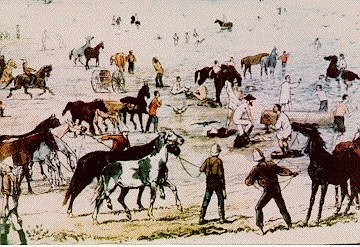
Aug. 8 we sighted the first buffalo in the distance, but did not get near them. On that day I had charge of the rear guard. Many teams and oxen had given out. I remember what a beautiful view there was from the top of a high hill to which I had ridden. The Old Wives lakes were in the distance, and as far as the eye could reach was a boundless prairie, partly burnt. Our party was moving along in the distance, and a few buffalo could be seen near the lakes. I had to send forward for rations, as I was two days in bringing in the party. A miserable looking lot they were. We remained several days at the Old Wives lakes. The water is slightly salt, and abounds with ducks, geese, and pelicans. We killed large numbers, which made a welcome addition to our mess. Lieutenant Colonel Macleod arrived while we were here, and brought a good supply of dried buffalo meat and pemmican with him. He left again at once for the same place for a further supply of oats, which we could not do without, as the horses were dying every day. At that rate we should soon have none left to take us through. Aug. 12 we met the first Indian camp on the plains. They were a party of Sioux returning from hunting buffalo further west. They were a very dirty looking lot, and did not give us a high opinion of western Indians.
We were over 500 miles from Dufferin, and pretty well out on the plains. We had met no white men since leaving the Souris river, and probably would not meet any for a long time to come. The grass was getting very short and dried out and we had to send a day ahead to find pasturage and water, a party being sent back to guide us to it. Aug. 15 a white man came in alone, saying he was a scout and had come up from Ft. Benton, Montana. He undertook to guide us to our destination, and was engaged as guide, but he afterwards proved to be as big a fraud as the rest of them. He told us many startling stories of the Blackfeet in the west being on the warpath, and the lawlessness and strength of the whisky traders at Fort Whoopup and other places.
Colonel Macleod came in on August 15, bringing a good supply of oats, which arrived just in time to save a general break-up of all our horses, which would have left us, as they in the west, afoot. Colonel Herchmer, of the boundary survey, came in with him t pay us a visit. Their camp was not more than 40 miles to the south of us. Aug. 19 we struck a good camp for feed and water, where we left a detachment of men in charge of a sergeant, with all our sick and played out horses. We also left a considerable supply of provisions, as it was intended that two troops would not remain in the west over winter, but return after the work of putting down the whisky traders was done. They could pick up these men and horses on their return.
Our rations were now pretty short, our allowance of bread bing not much over half a pound a day. It was looked upon as worth its weight in gold. Sugar we had been cut off from for some time. Many a fight occurred over a piece of bread, as each in the mess had his slice issued and the distribution was watched with jealous eyes. Many a good laugh we have had since over the rows we used to start over the rations, but it was a serious matter with us then.
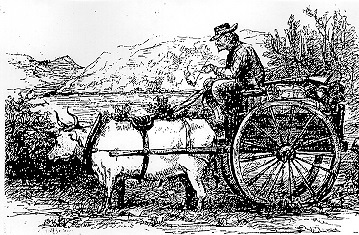
Aug. 21. We met the first party of halfbreed hunters, who had been out from Winnipeg after buffalo and were well loaded with pemmican and buffalo robes. A Catholic priest was with them. They had their families, and had been as far west as the Cypress hills. They had left Winnipeg in the early spring and had been out all summer. Their transport was mostly carts, drawn by small Indian ponies. They reported no feed between us and the Cypress hills, the country being all eaten off by buffalo.
These parties of halfbreeds started in those days every spring to go west to hunt the buffalo. They killed enormous numbers, as it took several animals to make one sack of pemmican, weighting about 150 pounds. Only the choicest parts were used. The rest was left lying on the prairie. A hundred or more animals would be killed in one hunt by a small party of hunters and the waste was enormous. They lived a happy life, camping out all summer, with plenty of game, and returning in the fall well loaded with pemmican and robes, from the sale of which they were provided for the winter and had enough over to give them a good start again in the spring. Their guns were primitive, being nearly altogether flint-lock muskets purchased from the Hudson’s Bay company, repeating and breach-loading guns being rarely seen among them. They were good shots and often came into collision with the Blackfeet and other Indians, who used to camp around the Cypress hill country to hunt. Many of them were killed, but they generally had the best of it, and they were active in running off bands of Indian horses in retaliation for thefts committed by the Indians.
Continued in Lost on the Plains.







Leave a Reply